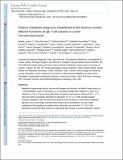Distinct metabolic programs established in the thymus control effector functions of γδ T cell subsets in tumor microenvironments
Author(s)
Lopes, Noella; McIntyre, Claire; Martin, Stefania; Raverdeau, Mathilde; Sumaria, Nital; Kohlgruber, Ayano C; Fiala, Gina J; Agudelo, Leandro Z; Dyck, Lydia; Kane, Harry; Douglas, Aaron; Cunningham, Stephen; Prendeville, Hannah; Loftus, Roisin; Carmody, Colleen; Pierre, Philippe; Kellis, Manolis; Brenner, Michael; Argüello, Rafael J; Silva-Santos, Bruno; Pennington, Daniel J; Lynch, Lydia; ... Show more Show less
DownloadAccepted version (5.905Mb)
Open Access Policy
Open Access Policy
Creative Commons Attribution-Noncommercial-Share Alike
Terms of use
Metadata
Show full item recordAbstract
© 2021, The Author(s), under exclusive licence to Springer Nature America, Inc. Metabolic programming controls immune cell lineages and functions, but little is known about γδ T cell metabolism. Here, we found that γδ T cell subsets making either interferon-γ (IFN-γ) or interleukin (IL)-17 have intrinsically distinct metabolic requirements. Whereas IFN-γ+ γδ T cells were almost exclusively dependent on glycolysis, IL-17+ γδ T cells strongly engaged oxidative metabolism, with increased mitochondrial mass and activity. These distinct metabolic signatures were surprisingly imprinted early during thymic development and were stably maintained in the periphery and within tumors. Moreover, pro-tumoral IL-17+ γδ T cells selectively showed high lipid uptake and intracellular lipid storage and were expanded in obesity and in tumors of obese mice. Conversely, glucose supplementation enhanced the antitumor functions of IFN-γ+ γδ T cells and reduced tumor growth upon adoptive transfer. These findings have important implications for the differentiation of effector γδ T cells and their manipulation in cancer immunotherapy.
Date issued
2021Department
Massachusetts Institute of Technology. Computer Science and Artificial Intelligence LaboratoryJournal
Nature Immunology
Publisher
Springer Science and Business Media LLC
Citation
Lopes, Noella, McIntyre, Claire, Martin, Stefania, Raverdeau, Mathilde, Sumaria, Nital et al. 2021. "Distinct metabolic programs established in the thymus control effector functions of γδ T cell subsets in tumor microenvironments." Nature Immunology, 22 (2).
Version: Author's final manuscript